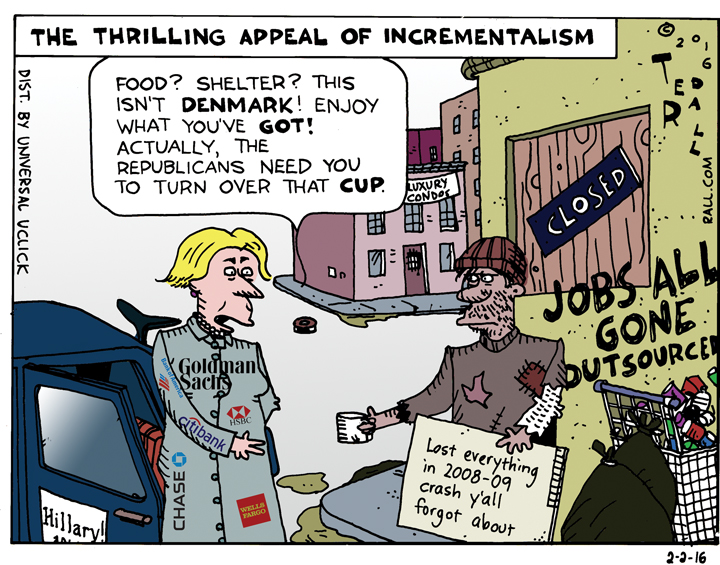Late last year, I interviewed Bernie Sanders while working on my biography “Bernie.” I asked him if he planned to reduce the defense budget if elected president. “We will take a hard look at that,” he told me, agreeing that there’s an awful lot of bloat in America’s military spending that ought to be cut.
Why doesn’t he say that now?
A statement detailing his intent to reduce military spending — not just the on-the-books budget of the Pentagon, but also the “off the books” taxdollars that go to wars like the occupations of Afghanistan and Iraq, as well as the National Security Agency and other parts of the surveillance state that have expanded radically since 9/11 — would help answer one of Sanders’ critics’ most potent criticisms: that he’ll be an irresponsible Santa Gone Wild, giving away free college tuition and Medicare for all without a care in the world for how to pay for it.
Hillary Clinton’s campaign, already reeking of desperation, is turning ugly. Bill Clinton, of all people, accused Bernie of lying, and his supporters of sexism. Clinton surrogate Madeleine Albright called female Sanders supporters traitors to their gender. The once-respected Gloria Steinem called them sluts, implying they were hanging out at Bernie’s big rallies to get laid by hunky Bernie bros.
Pathetic. But Hillary remains a potent force. She’s the mathematical favorite. When she casts herself as the realist (“a progressive who likes to get things done”), her argument that Bernie’s promises are politically unrealistic and fiscally irresponsible carries weight with Democrats who are still on the fence.
If Bernie can answer this two-part question, he wins the nomination: how will he get his far-left programs (by American standards, not those of the rest of the world) through Congress? How will he pay for them?
The first question, I think, isn’t as big a hurdle as the corporate punditry seems to think. Most voters can imagine a sustained progressive movement centered around street activism — Sanders’ “political revolution” — that pressures Congress so that, as Sanders puts it, Mitch O’Connell sees hundreds of thousands of people marching outside his window whenever he plots to thwart the people’s will.
Like Occupy Wall Street, except that the president is encouraging the movement rather than ordering the cops to beat up its members.
Anyway, liberal Democrats are angry. Hillary’s “half a dream” sales pitch isn’t half as enticing to them as Bernie’s ambitious agenda. Come on, Hill: did you take half a bribe from Goldman Sachs? Even if Bernie’s idealism gets dashed on the rocks of Republican intransigence, progressive Dems don’t care; they want to see Bernie try. Democrats haven’t watched a Democratic president push for radical change since LBJ.
The second question of the skeptics is: show me the money! Where is the cash to pay for free public college tuition and a single-payer healthcare system?
Sanders has said he would cover the $75 billion per year cost of his college reform program by imposing a tax on Wall Street speculation. He would almost certainly increase taxes on corporations and wealthy individuals as part of moving the tax code back to a more progressive, pre-Reagan structure. Everyone would pay a higher tax rate to cover Berniecare, though working-class people would pay less than they’d save.
At the risk of sounding like a Republican, there’s waste throughout the federal budget. There is, for example, no evidence that the NSA has ever done its job by preventing a single terrorist attack. Meanwhile, as Edward Snowden informed us, they’re spying on all our phone calls and emails. Shut them down; save $10 billion a year or more. Similarly, the Department of Homeland Security could be trimmed to a fraction of its current size or eliminated, with its tiny portion of useful activities transferred to other agencies, including law enforcement.
Last year’s defense budget was nearly $600 billion, or 54% of discretionary federal spending. That’s more than the next nine countries combined, including China and Russia. Conservatively, at least half of that is spent on waste and fraud by DOD contractors, so there’s $300 billion right off the bat. I bet we could cut it 90% and still not have to worry about a foreign invasion, something that hasn’t happened since 1812.
These cuts could easily cover the several hundred billion shortfall between Bernie’s tax increase on the rich and the cost of his healthcare plan.
Nothing says fiscal conservatism like pacifism. As of 2015 the wars against Afghanistan and Iraq, the most expensive in U.S. history, cost more than $1.5 trillion. More than $1 billion a year is still going down those ratholes. Bernie has said ISIS must be “crushed,” but he may want to revisit that. As of November, the anti-ISIS air and jihadi-training campaign had cost $5 billion and counting.
And obviously don’t start any new wars of choice.
Studies have shown that high student loan debt hobbles economic activity, delaying the age at which college graduates can afford to buy their first cars and homes. Freeing college graduates and their parents from exorbitant tuition bills would stimulate the automobile and real estate markets in particular, as well as the overall economy.
The same is true for healthcare costs. Every dollar you don’t spend on health insurance premiums, deductibles and co-pays is one you have for something else. That’s a lot of potential stimulus.
I don’t know why the Sanders campaign hasn’t issued a detailed plan explaining how President Sanders would cover the costs of free college tuition and Medicare for All. Maybe they’re worried about getting attacked as weak on national security by the hawkish Secretary Clinton and, in the general election, by the Republican nominee (probably Trump or Cruz).
Though a valid concern, it should take a back seat to plugging the Bernie-is-just-a-dreamer narrative Hillary’s camp is framing him with. He’ll never be able to out-militarist Hillary or the Republicans, who will try to brand him as the second coming of Vladimir Lenin anyway. Why bother to try?
(Ted Rall is the author of “Bernie,” a biography written with the cooperation of Democratic presidential candidate Bernie Sanders. “Bernie” is now on sale online and at all good bookstores.)



 Full disclosure: If New York’s primary were held today — not that it typically has a significant electoral impact, since it’s relatively late on the calendar — I’d vote for Bernie Sanders.
Full disclosure: If New York’s primary were held today — not that it typically has a significant electoral impact, since it’s relatively late on the calendar — I’d vote for Bernie Sanders.


 We’re not supposed to question juries. They’re our peers. They put in long hours, working hard essentially for free. Most of all, they see all the evidence. We don’t. We have to assume that they know what they’re doing.
We’re not supposed to question juries. They’re our peers. They put in long hours, working hard essentially for free. Most of all, they see all the evidence. We don’t. We have to assume that they know what they’re doing.